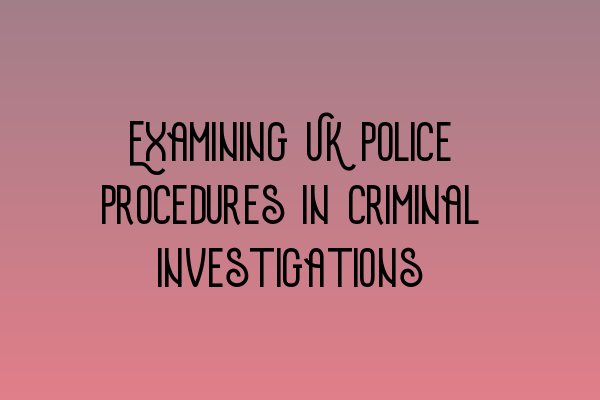Examining UK Police Procedures in Criminal Investigations
When it comes to criminal investigations in the UK, the procedures followed by the police play a critical role in ensuring a fair and just system. Understanding these procedures is crucial for legal professionals, as they can have a direct impact on the outcome of a case. In this article, we will delve into the various aspects of UK police procedures in criminal investigations.
The Initial Stages of an Investigation
Every criminal investigation in the UK starts with the police receiving information about a possible crime. This information can come from various sources, such as witnesses, victims, or even anonymous tip-offs. Once the information is received, the police assess its credibility and determine whether to initiate an investigation.
The investigation begins with gathering evidence, interviewing witnesses, and securing the crime scene. This initial phase is crucial as it sets the foundation for the entire investigation. The police must ensure that all relevant evidence is collected and preserved to establish the facts of the case.
During this stage, it is essential for the police to follow proper procedures to safeguard the integrity of the evidence. Failure to do so can lead to evidence being deemed inadmissible in court, which can severely impact the prosecution’s case.
Arrest and Detention
If the police determine that there is enough evidence to support the arrest of a suspect, they have the power to apprehend the individual. The suspect must be informed of the grounds of their arrest and their legal rights, including the right to remain silent and the right to legal representation.
Once arrested, the suspect can be held in custody for a limited period for further questioning and investigation. The police must follow strict guidelines regarding the duration and conditions of detention to ensure the suspect’s rights are protected.
It is important for legal professionals to be aware of the limitations on police powers during the arrest and detention process. Understanding these procedures can help identify any potential breaches of the suspect’s rights, which can be raised as a defense in court.
Evidence Gathering and Disclosure
Throughout the investigation, the police gather evidence to build a case against the suspect. This evidence can include witness statements, forensic evidence, CCTV footage, and any other relevant information. The police have a duty to disclose all relevant evidence to the defense, even if it may undermine their case.
Proper disclosure of evidence is crucial for ensuring a fair trial. Legal professionals should be well-versed in the procedures surrounding evidence gathering and disclosure to effectively represent their clients. Failure to comply with these procedures can lead to serious consequences.
Conclusion
Examining UK police procedures in criminal investigations highlights the importance of following proper protocols to ensure a fair and just legal system. Legal professionals must possess an in-depth understanding of these procedures to effectively represent their clients and ensure their rights are protected.
In order to succeed in the SQE exams and build a successful career in criminal law, it is crucial to have a comprehensive knowledge of UK police procedures. Enrolling in reliable SQE 1 preparation courses and SQE 2 preparation courses can give aspiring legal professionals the necessary foundation to excel in their future careers.
To explore practice exam questions and mocks, visit our SQE 1 Practice Exam Questions and SQE 1 Practice Mocks FLK1 FLK2 articles. Stay updated on the latest SRA SQE exam dates and information by visiting our SRA SQE Exam Dates article.
